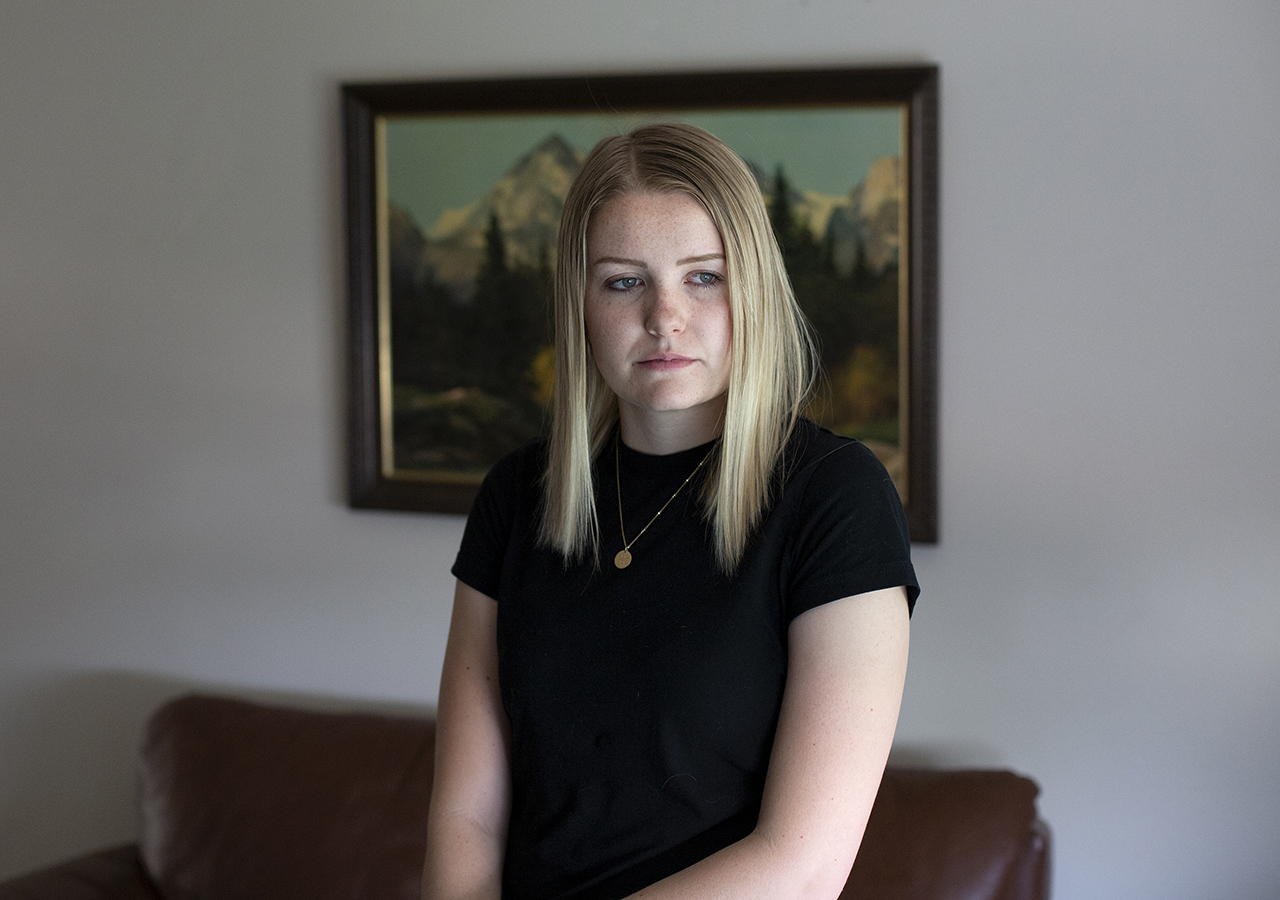MESQUITE — Standing before some of her hometown’s most powerful leaders, Kylee Tobler was suddenly aware of the uneasiness in her breath. She leaned into the microphone.
“When I was 16 years old,” she said, her voice wavering, “I got a message on Instagram from a man who was three years my senior.”
The story she was about to tell in a Mesquite City Council meeting is one she wasn’t sure she would ever be ready to share. Tobler clutched onto the papers containing her statement.
“In the course of our secret relationship,” she continued, “I was abused emotionally, physically, and one December night I was assaulted sexually.”
Tobler had kept this part of her past buried away for years. But in early October, her most guarded secret was thrust into the public eye without her consent in a series of fast-moving events she never could have predicted.
Update: Colleague of Mesquite councilman resigns from nonprofit board
By the time she had decided to take back her story at the City Council meeting on Oct. 13, various versions of it already had been shared and publicly discussed throughout Mesquite.
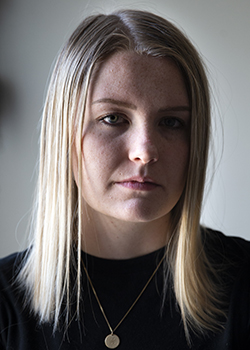 Kylee Tobler, 21
Kylee Tobler, 21The impact was profound.
Mesquite was left without a city attorney and manager. One of the community’s main news sources ceased publication, citing threats the publisher blamed on the city’s police union. Sexual assault survivors and other community members called for public apologies from city and law enforcement officials.
“There became a divide within the city, and this divide got really, really ugly,” Brian Wursten, a member of the City Council, said in June. “It was just as ugly as it gets. Accusations thrown. Dirty things.”

‘Nothing further’
A stopping point for travelers along the country’s southwest portion of Interstate 15, the city of Mesquite is nestled in the Virgin River Valley, about 80 miles northeast of Las Vegas and a stone’s throw from St. George, Utah. Covering roughly 32 square miles near the Nevada-Arizona border, Mesquite has a small-town atmosphere, though it is one of the fastest-growing communities in the country.
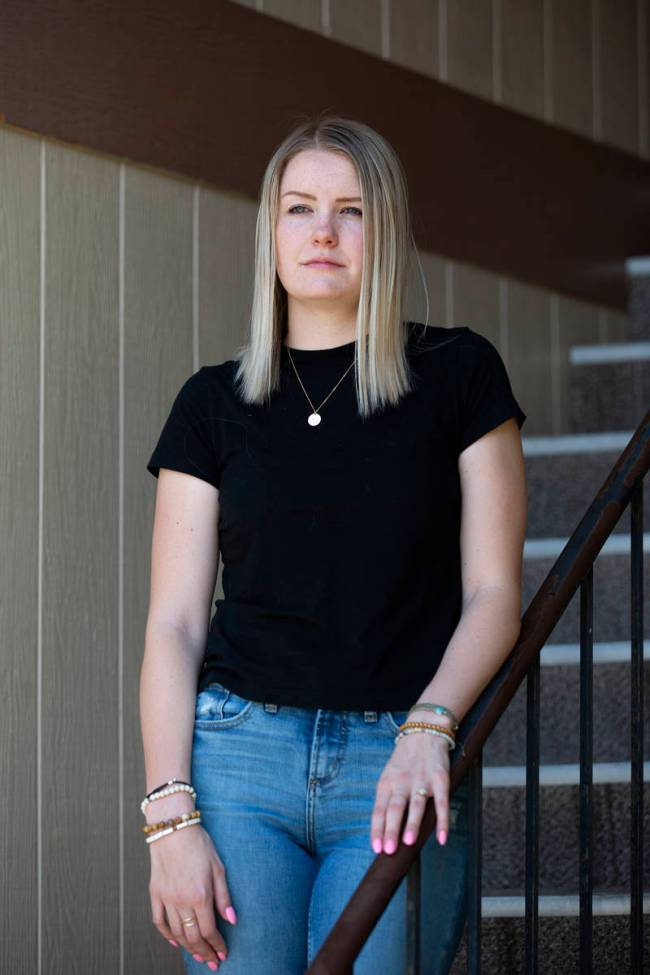
Between 2010 and 2019, the town that housed 800 at its 1983 incorporation in Clark County, Nevada, grew nearly 30 percent, from about 15,200 to just over 19,700, according to the U.S. Census Bureau.
“It’s not so small that everybody knows your business, but the only way to keep a secret if you tell one person is if that person dies before they’ve had a chance to jump on Facebook,” said former reporter Barbara Ellestad, who moved to Mesquite in 2001 and covered the city for nearly 15 years before shutting down her online news website, the Mesquite Citizen Journal.
Tobler, now 21 and married, was born and raised in Mesquite. Her father, Shawn, is the city’s deputy fire chief.
In the summer of 2016, a charming 19-year-old man came into the gourmet soda shop where she worked to ask her out on a date. She fell for him — and fast.
They sneaked around for months, keeping their relationship secret from her parents, who disapproved of their age difference. Around this time, her parents and friends noticed a change in her demeanor.
“My abuser went on to manipulate my mind bit by bit into believing that he was the only person that cared about me and that my parents, my friends, and anyone else who stood against us were evil and not people I needed to allow into my life,” Tobler would recall years later during the City Council meeting. “This alienated me from my family, my friends and my passions, and resulted in extreme depression and anxiety that I still struggle with to this day.”
For weeks after the alleged assault, Tobler said in a June sit-down interview with the Las Vegas Review-Journal, she suffered in silence, struggling to navigate what happened that December night.
He loves me, she would tell herself. It’s OK that it happened because he’s my boyfriend.
But as her justifications fell apart, so too did Tobler.
On Dec. 20, 2016, a few days after the alleged assault, Tobler wrote in her diary: “Nobody knows what happened that night and I doubt anyone ever will because that night changed me. Not in a good way. Im still numb. Sometimes when my phone rings I ignore it. The person calling is looking for Kylee Tobler. I don’t feel like her.”
A month later, she turned to her parents for help. The following day, on Jan. 20, 2017, her parents went down to the police station to file a report on her behalf.
Mesquite police records obtained by the Review-Journal show that the investigation was closed “as unfounded” in less than a week.
“Nothing further,” wrote Mesquite police officer Ian Douglas. Time stamp: Jan. 26, 2017, at 8:31 a.m.
Her parents were stunned.

The unraveling
Tobler’s secret began to unravel in an unlikely setting in the fall of 2020: the race for the city’s highest-ranking position.

Mesquite’s longtime mayor, Allan Litman, faced a challenge from then-City Attorney Bob Sweetin. The race quickly turned hostile.
By September, the Mesquite Police Officers Association, the police force’s union, had settled on endorsing the mayor.
In a series of mailers urging Litman’s re-election, union officials detailed the case involving Tobler, which they believed Sweetin, in an “abuse of power,” had wrongly prosecuted years earlier.
“We believe this young man was criminally charged for an offense he never should have been charged with,” reads the first of at least two mailers distributed by the union.
Sweetin charged Tobler’s ex-boyfriend with a misdemeanor and eventually offered him a plea deal, according to court records. He did so with Tobler’s blessing.
“I was in no emotional state to go through a big trial,” Tobler recalled in the June interview. “Mostly, we just wanted him away so that I could have an opportunity to heal without him anywhere in the picture.”
As part of the deal, the records show, Broc Smith pleaded guilty to one misdemeanor count of contributing to the delinquency of a minor. The deal did not include any jail time but required Smith to stay away from Tobler, her family and Tobler’s workplace until her 18th birthday in 2018.
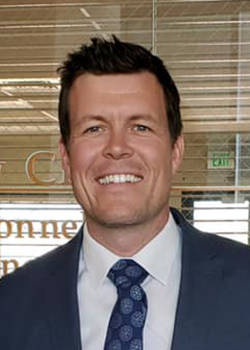
“So he took the plea deal, and that was that,” Tobler said. “Until the letters came out.”
Tobler, by then, had known for days that the mailers were coming.
One night in early October, while getting ready for bed, she got a call from her father.
“Honey,” he said, “just so you know, there’s this letter that’s coming out in the next couple of days. I’m sorry. I tried to stop it. I tried talking to the chief.”
Earlier that day, her father had gotten his hands on a leaked email thread containing a draft of the union’s first letter. The emails, a copy of which was obtained by the Review-Journal, show that it was sent from Mesquite police Sgt. Wyatt Oliver, who serves on the union’s board of directors, to police Chief Maquade Chesley.
Five hours later, the document shows, the police chief forwarded the draft to Councilman George Gault for his review.
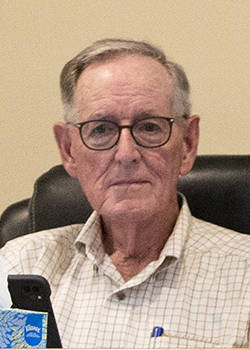
The first letter hit mailboxes as early as Oct. 7 last year.
“An official investigation was conducted by the Mesquite Police Department,” the letter stated. “The results were documented in a full police report and reviewed by a supervisor. The investigation showed that no probable cause existed that showed any crime had been committed.”
Police records identify the supervisor as Sgt. Tracy Fails, a friend of Smith’s family.
Under the Nevada Public Records Act, the Review-Journal requested all communications related to the criminal case and the mailers dating to January 2017. In response, city officials claimed that a majority of the records were protected by attorney-client privilege.
They released 10 heavily redacted email threads, nearly half of which were the Review-Journal’s own emails seeking the records.
The leaked email thread that landed in the hands of Tobler’s father was not included in the small batch of released records, though that email chain does not appear to fall under attorney-client privilege. The city has not responded to requests seeking clarification regarding the exclusion of those emails.
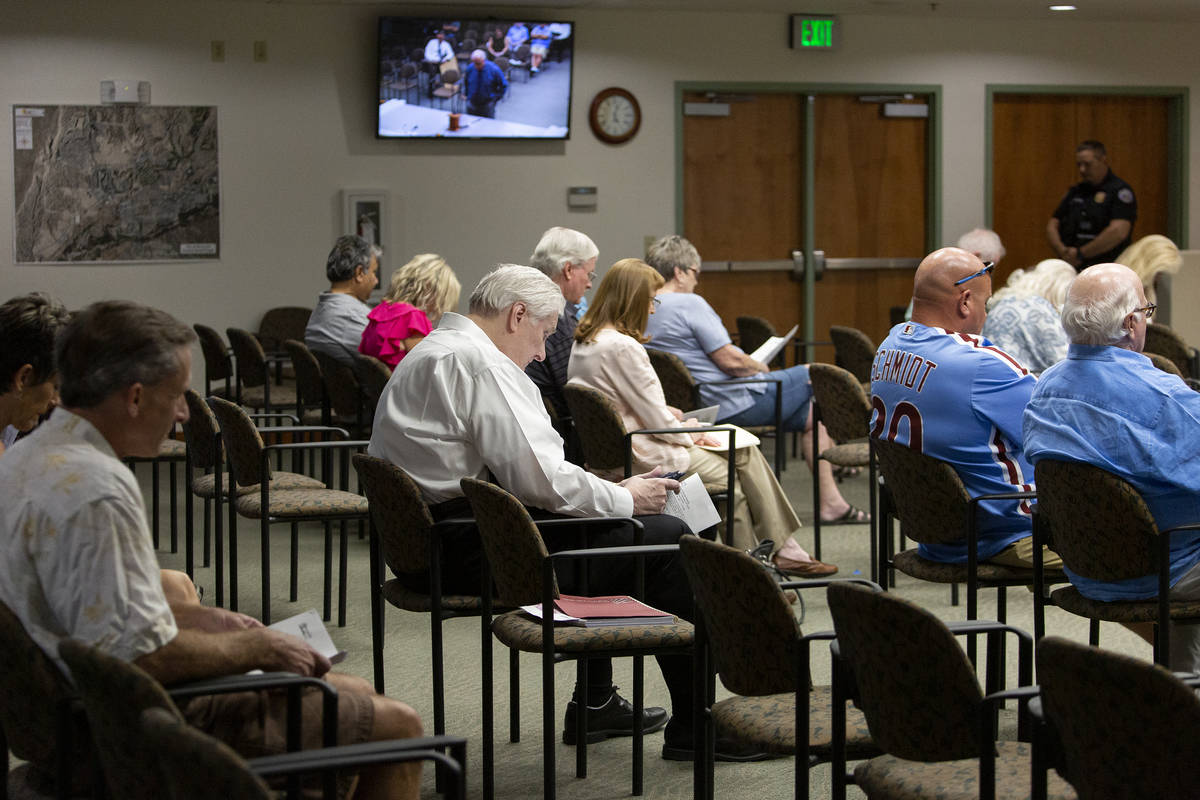
‘Exposed’ and ‘exploited’
The union mailers did not identify Tobler or Smith by name.
But days after the first letter, during an event hosted by the police union, the wife of a police officer discussed the case.
“He is currently serving in the Marine Corps,” the woman, Jodi Thornley, said of Tobler’s ex-boyfriend. Those in attendance applauded. “He is an awesome young man. His name is Broc Smith.”
As a result, Tobler was identified. Within hours of the event, which was livestreamed to the union’s Facebook page, Tobler’s phone began to blow up with messages and calls: “Did you see this? Are you OK?”
“They didn’t have to say my name because it’s a small town,” Tobler told the Review-Journal. “Everybody knows everybody.”
Thornley, who later apologized on Facebook for her involvement, spoke about the case for several minutes, despite at one point in her speech admitting that “there’s so many things about this case that I don’t understand.”
“He was 18,” Thornley incorrectly reported. “Some people thought it meant he was 25 or she was 16 or something. I think that’s just a little bit important to note.”
Tobler’s age has largely been the focus of discussion.
The second mailer from the union reads: “We remind the public the age of consent in Nevada is 16 years old. If any 16 year old male or female engages in a consensual sexual relationship with an 18 or 19 year old adult, even though the 16 year old’s parents oppose the relationship, it is not a sex offense.”
Tobler maintains that what occurred in her bedroom in December 2016 was not consensual.
Councilman Gault, who reviewed a draft of the first political mailer, said in a City Council meeting: “You remember being in love as a teenager. You remember the days you were absolutely convinced that you were so in love with that person that you would do anything to keep that relationship.”
“I think that was pretty much what was going on here,” he concluded. “This is not a case about sexual assault.”
Tobler was in the audience that evening. She couldn’t believe what she was hearing.
“These people don’t know me. If I pass them in the grocery store or on the street, I would have no idea who these people are, but they thought that they were justified in giving their opinion on whether I was assaulted or not, or whether things were handled correctly,” she said. “It was put out in a political mailer, but this was not a political topic.”
Gault later told the Review-Journal that, as he reviewed the letter’s content, he “had no idea that it was just going to turn into a nightmare for everybody.”
Mayor Litman has disputed the idea that his city is fractured.
“I don’t see much of anything occurring after the election,” he told the Review-Journal in June, “other than a number of disgruntled people that obviously voted for the opposite side and didn’t want to let it go.”
But for months, during contentious City Council meetings, sexual assault survivors and other Mesquite residents have told the mayor otherwise.
“The police of Mesquite took an oath to protect and serve. How are they protecting the two families whose case was dumped out on our citizens with just enough information to start the rumor mill?” June Smothers, who volunteers with a local support group for sexual assault survivors, said in one meeting. “Instead of protecting, the MPOA exposed these families and exploited their case, and in the process shamed a victim. An apology could have been brought that would bring peace to this situation, some form of peace, but no apology has come.”
‘Beyond any reasonable doubt’
After learning that his daughter’s case had been closed, Shawn Tobler sought advice from Sweetin, the city attorney.
Union officials and the mayor have accused Sweetin of prosecuting the case as a favor to Shawn Tobler, who disputed this at the Oct. 13 City Council meeting.
“The city attorney did at the time and continues to live in the same neighborhood as I do,” he said. “In 2016, I had no different relationship with him than I did with many of my other neighbors that live in my neighborhood. I don’t believe that living near the city attorney and having occasional neighborly conversations constitutes friends with benefits.”
Sweetin, a former federal prosecutor, reviewed the evidence, including hundreds of letters and messages exchanged between the couple.
“Kylee was a victim of a crime, and the evidence demonstrated that beyond any reasonable doubt,” Sweetin told the Review-Journal. “The Mesquite Police Department’s attempt to misrepresent what happened to her for their own political gain demonstrates a misogynistic culture led by police administrators who are more concerned with absolute control of a community rather than any sincere concern for Mesquite or its residents.”
Smith’s statement made it into the final police report, records show. Kylee Tobler’s statement, for unknown reasons, is missing.
Officer Douglas, who prepared the report, spelled Tobler’s first name incorrectly throughout the file.
“Broc initially said he did not go to the Tobler’s residence to spend the night, while her parents were away,” Douglas wrote.
Yet four paragraphs later, the officer wrote that “Broc appeared honest” during the interview. The officer also noted in his report that “Broc said he loves Kaylee.”
Efforts to reach Smith, his parents and his attorney, Robert Draskovich, for comment were unsuccessful.
But Smith’s father stood up at an Oct. 27 council meeting to defend his son.
“My son is wrongfully being associated with sexual assault, rape and the whole Me Too movement, which is not even remotely the case,” he said.
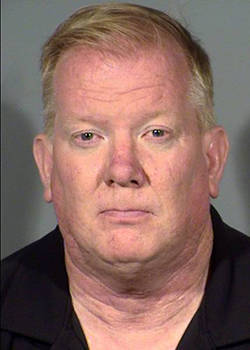
During the investigation, Tobler said, a detective named Gary Erickson stopped by her family’s home to drop off her cellphone, which had been taken for evidence collection. When the detective, a 19-year veteran on the force, turned to leave, Tobler’s mother told him, “Kylee would like to talk to you.”
Their conversation lasted about 10 minutes, Tobler said. It’s unclear what Erickson did with her statement.
The following year, Erickson was arrested after the parents of a 15-year-old in St. George contacted authorities about photos the teen had been exchanging with the detective. Erickson pleaded guilty in 2019 to a charge of crossing state lines to engage in illicit sexual conduct and is serving time in a federal prison.
Sweetin confirmed that Erickson worked on the case, and a series of text messages from March 2017 saved by Tobler’s father also confirm his involvement.
But in an email to the Review-Journal, Mesquite police spokesman Quinn Averett, citing the police report for the case, said: “Our records indicate that Detective Erickson was not involved and did not interview Tobler.” Averett did not respond when asked why the victim would not have been interviewed.
“You know,” Tobler said, “it’s hard to get a gauge for the situation when you don’t have the complete set of facts.”
‘Something needs to change’
One former councilman has described the aftermath of the mailers and the election as a “civil war.”
Sweetin ultimately lost his bid for mayor during the November election. He agreed to resign in January to ensure a smooth transition, but the city terminated him without cause a month early during a special meeting.
After this story was published online, state Attorney General Aaron Ford released the following statement to the Review-Journal:
“Citizens must be able to trust their law enforcement officers to do their jobs ethically, and prosecutors to make their decisions based on evidence and constitutional requirements. It is essential that, in the course of our duties as law enforcement, the rights and privacy of victims are protected, and citizens’ tax dollars are used appropriately. I urge anyone with information about a potential violation of state law to file a complaint with our office.”
Click here to file a complaint, or send an email to aginquiries@ag.nv.gov.
The letters — described by Sweetin as “one of the saddest and sickest things I have experienced in my career in public service” — prompted a third-party investigation conducted by law firm Fennemore Craig.
The investigation, according to then-City Manager Aaron Baker, found that city resources were used in the creation and editing of the mailers:
■ On-the-job knowledge, which Mesquite police obtained through their work for the city, was used to prepare at least portions of the content of the mailers.
■ City facilities at the Mesquite police station were used by city personnel to discuss a draft of the mailer.
■ A city laptop was used to edit the mailer before its dissemination.
City officials refused to release a copy of the investigation’s findings to the Review-Journal, again citing attorney-client privilege, despite the city manager reading large portions of the report in a City Council meeting.
In that same meeting, Councilman Wursten said: “What the Police Department has established at this point is that if you run for office, and they do not like you, they will use city resources to come after you.”
Baker resigned in May.
More than 10 months after the first letter was mailed to Mesquite residents, Tobler said she has yet to receive an apology from those involved. It also remains unclear whether the mailers led to any disciplinary action.
“No matter what happens,” she told the newspaper, “I was glad I stood up there and I told them that this was wrong and that it wasn’t OK for them to use my story without my consent.”
While standing before some of her hometown’s most powerful leaders last October, a sense of empowerment soon washed over Tobler. She looked up from the microphone to face the City Council.
“Members of the council and members of this community have a responsibility to victims like me,” she said. “This is unacceptable behavior, and something needs to change.”
Contact Rio Lacanlale at rlacanlale@reviewjournal.com or 702-383-0381. Follow @riolacanlale on Twitter. Review-Journal staff photographer Ellen Schmidt contributed to this report.



